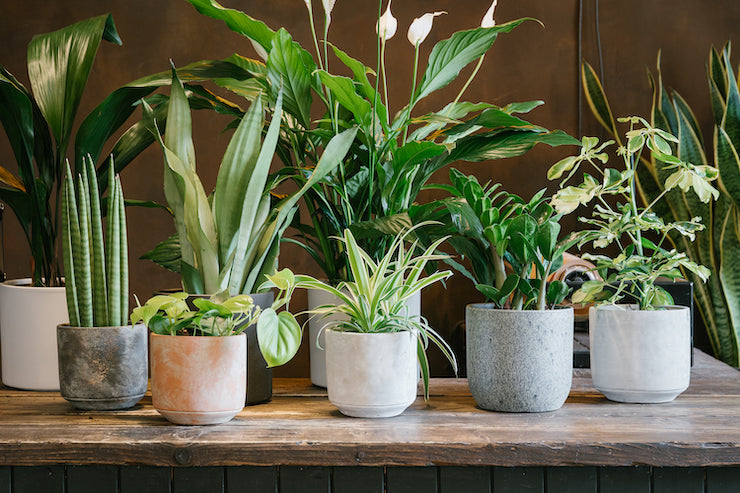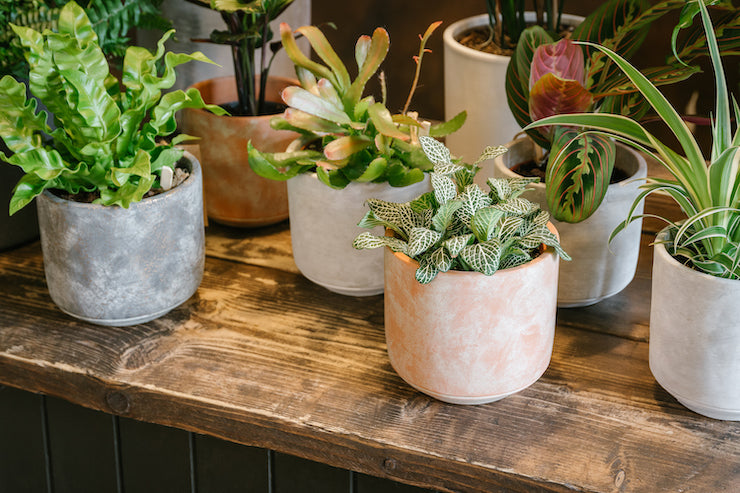
What soil is best for my indoor plants?
There are different tiers of houseplant enthusiasts, from those with limited knowledge and experience to those who have transformed their spare room into a giant greenhouse. Whether you are a rookie seeking to slowly elevate your plant care routine or an enthusiast thinking about whether it’s worth adding extra components into soil – we know compost can get a little confusing! So, let’s break down the ingredients and help you find the perfect compost to keep your houseplants happy and healthy.
When creating compost for indoor plants, we recommend starting with Soil.Ninja Base Mix and then adding additional elements to tailor it to specific plant requirements.
Perlite
Perlite is recognisable by its tiny, white pellets which are often mixed into composts. Whilst basic compost mixes do not always contain perlite, premium mixes usually have a percentage of perlite added for aeration around plant roots. This soil component is composed from volcanic glass which is heated at around 1000 degrees until it ‘pops’. It is primarily used for compost aeration due to its porous nature and low water retention. Its neutral pH also does not affect the overall pH of compost. When using more basic, budget friendly compost such as Houseplant Focus we always recommend adding at least 20% perlite to 80% compost. Dampen perlite before use to avoid inhaling its dust.
Available in 3L bags of BetterGrow Perlite
Vermiculite
Vermiculite is a naturally occurring mineral and can be identified by its gold, flaky appearance. It is a naturally occurring mineral that has been heated at high temperatures to allow it to expand. It is a very similar component to perlite as it increases aeration around the plants root system, however this component is predominantly used for its ability to store larger amounts of water and nutrients by expanding as it takes up excess moisture. It will then slowly release its water store back into the compost for days after the plants initial watering. This one is a great addition for composts of thirstier plants such as ferns. This tiny movement from the expanding vermiculite also creates small air pockets in the compost to increase aeration.
Choose Soil.Ninjas Vermiculite available in 2.5L
Activated Charcoal or Activated Carbon
Activated Charcoal or Activated Carbon can come in chunky or fine forms and is easily identifiable by its black gritty texture. This soil component is predominantly used as a natural filter that prevents bacteria, mould and other impurities building up within the soil. Activated Charcoal is also porous so not only does it trap soil toxins but can also soak up excess water to prevent rot in your houseplants. It’s great to add this into most of your houseplant composts and is essential to terrarium building.
Choose from Soil.Ninja 1L Activated Charcoal or our Terrarium Activated Carbon in 180ml.
Zeolite
Zeolite is probably one of the only soil components that needs a more scientific explanation. The main use of Zeolite is to improve cation exchange capacity. It is a negatively charged particle which attracts positively charged micro and macro nutrients to the plant. The collected nutrients are then transferred from the Zeolite to the plants roots. Due to its ability to absorb nutrients adding Zeolite into your compost can also reduce fertiliser burn if you have accidentally over fed your plant. This component also works as a moisture controller and aerator within the compost.
We recommend Soil.Ninjas Fine Zeolite available in 1L.
Grit
Grit is composed of crushed quartz and has a whole host of uses. Grit is predominantly recommended when creating compost for Xeric plants. These are plants that naturally grow in environments with low moisture like rocky terrain and therefore prefer their soil to retain very little moisture like Aloes or Yuccas. Due to its non-porous nature grit adds lots of drainage when added into compost. It also creates great structural stability to root systems. Grit is also a popular decorative top dressing and Fungus Gnat preventative.
Choose from Soil.Ninjas 2.5L bags of grit for smaller pots use our 850ml tubs of Decorative Grit. For a top dressing substitute we recommend giving Shell on Earth a go. Available sizes include 1kg or 3kg of crushed Whelk Shells.
Sphagnum Moss
Sphagnum Moss is a used within compost mixes for several reasons. On its own this is added as a top dressing to plants to increase humidity levels. It is commonly added to compost for its excellent moisture retention. Sphagnum Moss is also a popular choice for propagating. This is due to its ability to store a huge amount of water, before slowly releasing it meaning root nodes – which need constant moisture to promote growth – propagate well in this median.
We recommend Soil.Ninjas 5L Sphagnum Moss
Bark
Unsurprisingly bark is simply made up of tree bark. This soil component is predominantly used to add aeration to compose as its chunky nature creates air pockets within the soil which improves root growth. Bark can also be used to lower PH levels. You may have noticed that bark is a popular growing medium for Epiphytic plants such as orchids. This is due to the bark supporting the plants aerial roots and allows them to comfortably grow within the mix.
We recommend Soil.Ninja Bark which is sourced from 100% FSC certified well managed forests. This bark is available in 2.5L bags. Alternatively, choose our 8L bags of Orchid Focus.
Worm Castings
Lots of little nutrient rich worm poops, worm castings are a great addition to most compost mixes. They offer an incredible natural fertiliser which is full to the brim with lots of macros and micronutrients. Reap the benefits of some wormy waste by mixing it into your compost or add a layer on top before watering your houseplants.
We recommend choosing Soil.Ninja Worm Castings which are available in 2.5L bags.
Coco Coir
Coco Coir is made up of a fibrous husk found inside of coconuts and is already present in many pre-made compost mixes. Coir is a completely organic component which offers excellent drainage as well as moisture and nutrient retention. It also introduces amazing aeration by creating optimum levels of air exposure.
Our go to for coir is For Peats Sake! 100% coco coir block is 100% peat free and is designed to be rehydrated prior to use. Available in 3L or 11.5L.
Whether you choose to add many compost elements or minimal, check out our range of compost mixing ingredients online or in store today!



